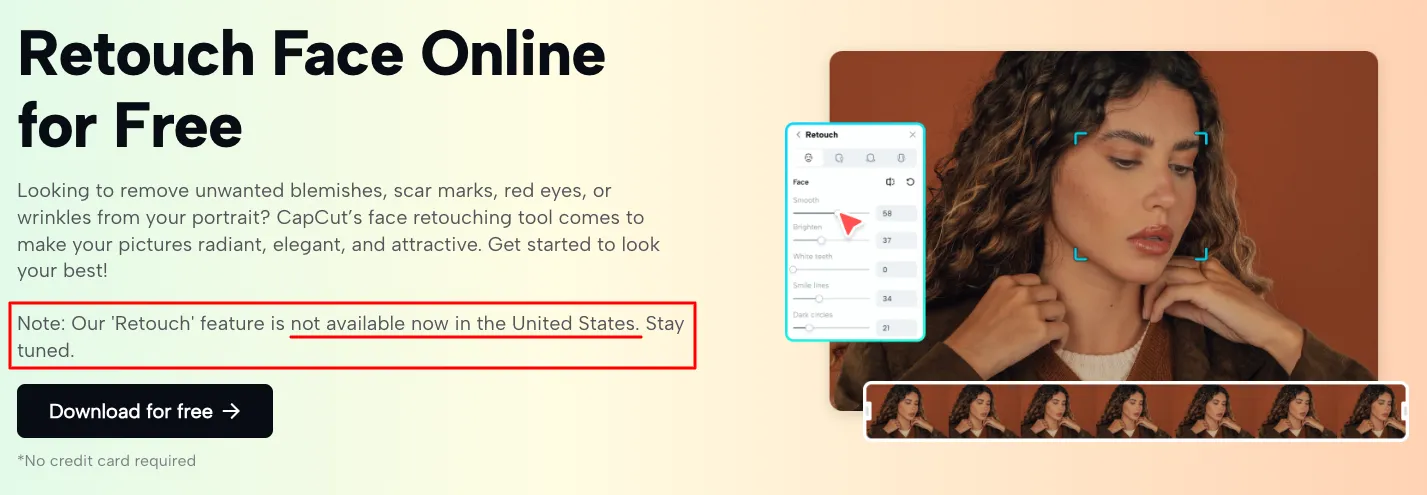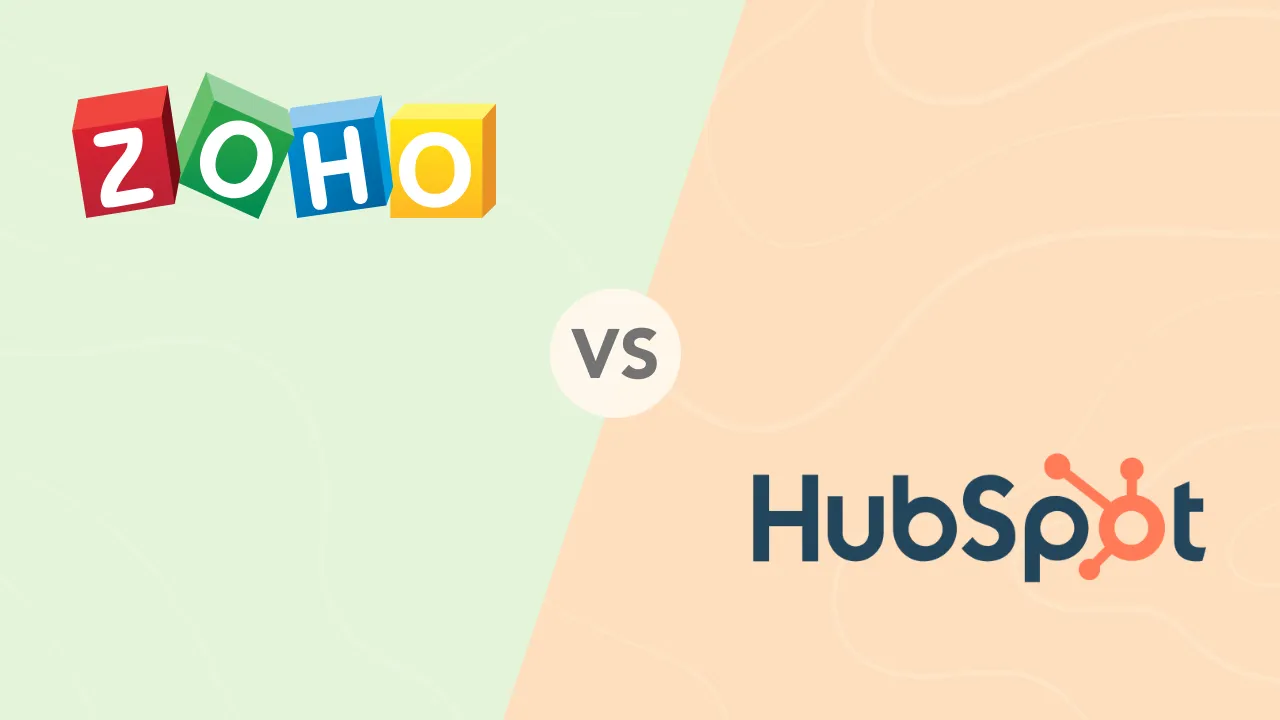Best Keyword Research Tools to Boost Your Rankings

Comparing keyword research tools is crucial if you want to find the best SEO tool for your business. These tools can optimize content and help you understand market dynamics in SEO and website optimization.
A free keyword generator is particularly useful for generating keyword ideas, especially for beginners who are just starting out. It contrasts with paid tools in terms of the volume and quality of keyword suggestions provided.
Here are some keyword research tools you can use to analyze and identify keywords that will drive targeted traffic to your website. There are several types of keyword research tools, each with its own set of features.
By comparing these tools, you can make an informed decision to ensure effective and cost-efficient optimization of your SEO strategy.
What is Keyword Research?
Keyword research is the process of identifying and selecting the most relevant and high-traffic keywords related to your business, product, or service. This involves analyzing search volume, competition, and user intent to determine the best keywords to target for your online marketing campaigns. By understanding what your target audience is searching for, you can optimize your content to rank higher in search engine results pages (SERPs). Effective keyword research is crucial for both search engine optimization (SEO) and pay-per-click (PPC) advertising, as it helps you attract the right audience and drive more targeted traffic to your website.
Best Keyword Research Tools
|
Tool |
Best For |
Standout Feature |
Free Plan Limitations |
|
Detailed SEO insights |
Comprehensive SEO health reports |
No free plan is offered |
|
|
Organic Keywords monitoring |
Performance reporting |
Unlimited |
|
|
Trend analysis |
Search interest trends over time |
Unlimited |
|
|
SERP Checker |
Competitive analysis |
Topics/keyword intent |
Unlimited |
|
All-around research |
Keyword prioritization metrics |
10 queries per month |
|
|
Advanced SEO Analytics |
Extensive toolkit for SEO and PPC |
14 days free trial |
|
|
Entry-level SEO insights and audits |
SEO audit tools |
Limited searches per day |
|
|
Content ideation |
Visualization of search questions |
Limited searches per day |
Keyword research involves identifying and analyzing the search terms people use in search engines to find information, products, or services. Choosing the right, highly relevant keywords is essential for effectively reaching the target audience. This strategic selection boosts both click-through rates (CTR) and conversions, as it aligns content with what users are actively searching for. By optimizing content around these keywords, you improve search engine visibility and drive organic traffic, helping your content perform better in search engine results and attract more qualified visitors.
Top 8 Keyword Research Tools
1. Ahrefs Keyword Explorer Tool
Ahrefs keyword explorer tool extends beyond the capabilities of Google Search Console, offering detailed insights into SEO health, keyword rankings, and backlinks. It’s particularly powerful for identifying and resolving over 140 different SEO issues, providing deep analysis capabilities that help you understand and optimize your site’s performance effectively. Additionally, Ahrefs provides accurate search volume data, which helps users understand keyword popularity and refine their SEO strategies.
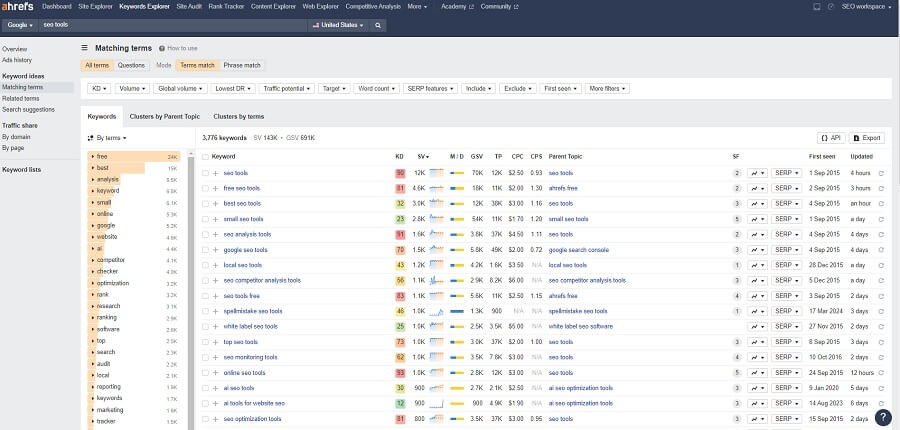
- Best for: Website owners seeking comprehensive SEO insights
- Standout Feature: Extensive SEO health reports
- Free Plan: No free plan is offered.
- Features & Functionality: Offers robust site audits, backlink analysis, and performance metrics.
- Pros: Comprehensive issue detection and in-depth SEO reporting.
- Cons: Providing only the full versions.
- Ideal for: Those requiring detailed analysis of their site’s SEO and competitive positioning.
2. Google Search Console
Google Search Console provides essential tools for monitoring your website’s performance in Google Search. It offers valuable insights into search traffic, indexing status, and optimization issues, making it indispensable for SEO management.
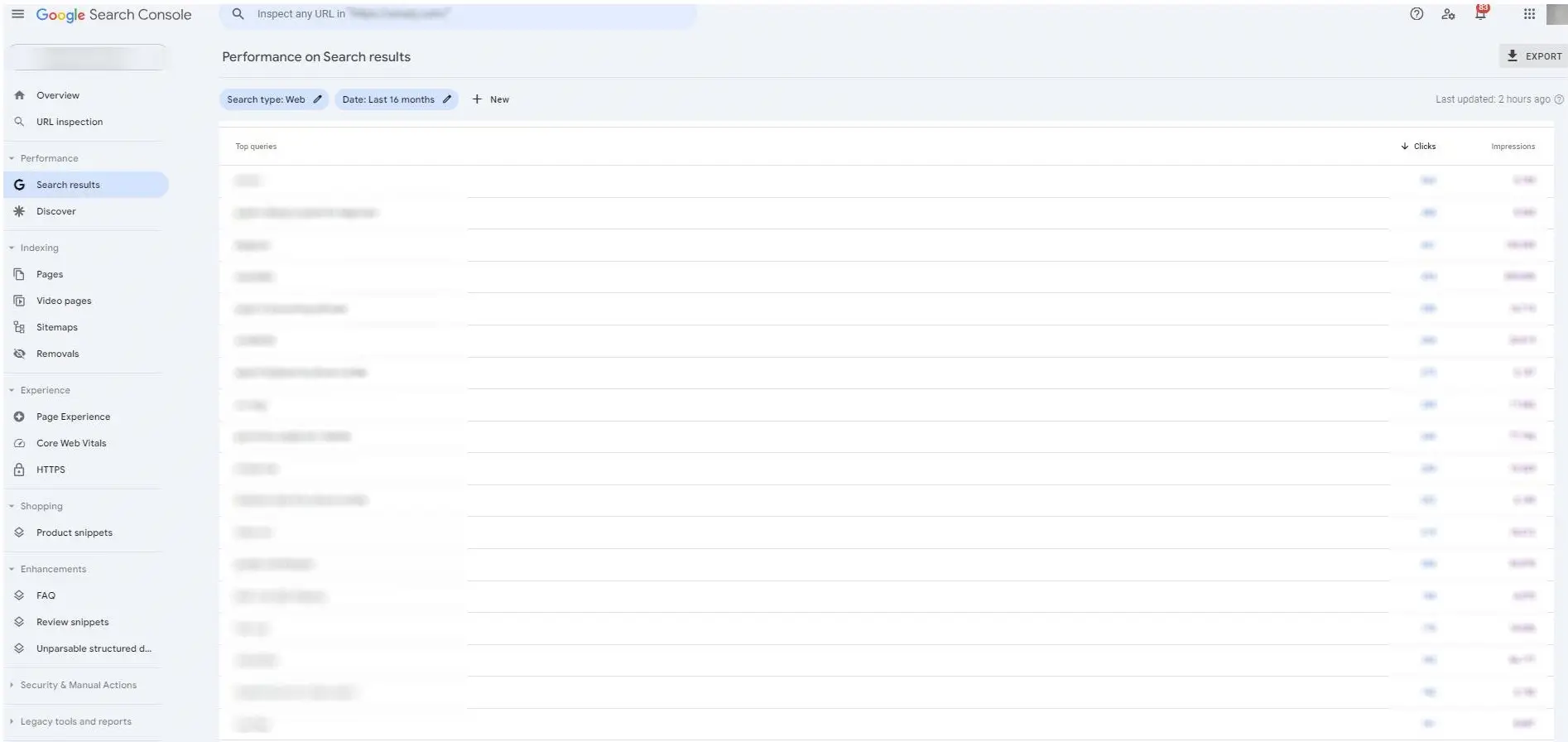
- Best for: Monitoring and optimizing website performance in Google search
- Standout Feature: Performance reporting for top 1,000 keywords
- Free Plan: Full access to search performance data
- Features & Functionality: Tracks search traffic, manages sitemap submissions, and monitors and resolves website errors.
- Pros: Direct integration with Google, detailed reporting on search performance.
- Cons: May be less intuitive for beginners.
- Ideal for: SEO professionals and site administrators needing detailed search analytics.
Best SEO Tools
 Research database with 24B+ keywords
Research database with 24B+ keywords  Competitor data: Keywords, backlinks & ads
Competitor data: Keywords, backlinks & ads  Find content ideas & link opportunities
Find content ideas & link opportunities  Audit & optimize your website SEO
Audit & optimize your website SEO  Competitor analysis tool to stay ahead
Competitor analysis tool to stay ahead  Seamless integration with marketing tools
Seamless integration with marketing tools  Save Time on SEO
Save Time on SEO  Ensure Content Originality
Ensure Content Originality 3. Google Trends
Google Trends analyzes the popularity of search queries across many regions and languages, providing a dynamic way to gauge public interest and identify trending topics.
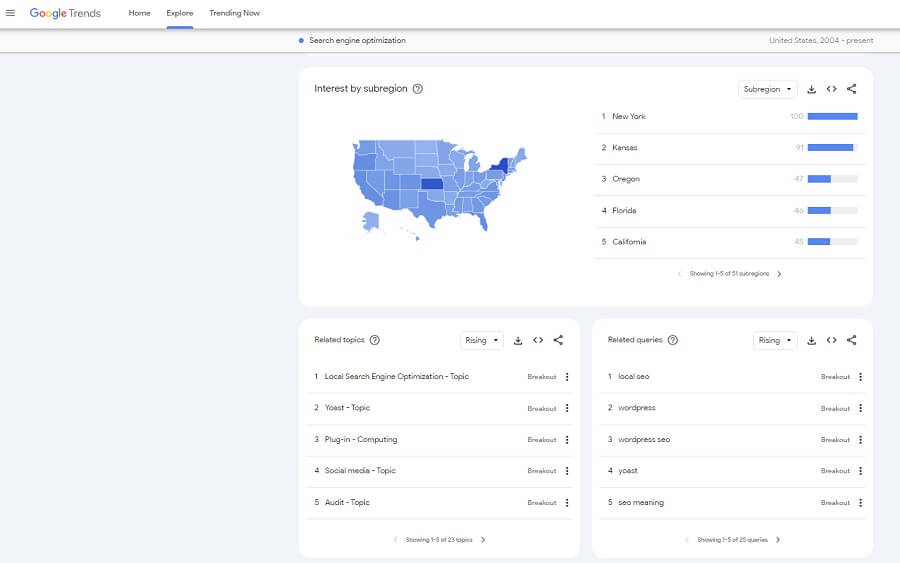
- Best for: Identifying trending topics and keywords
- Standout Feature: Visualization of search interest trends over time
- Free Plan: Unlimited access
- Features & Functionality: Tracks search term popularity over time and across different locations.
- Pros: Useful for identifying market trends and seasonal demand.
- Cons: Relative search volume data requires additional context for full analysis.
- Ideal for: Marketers and content creators looking to create relevant and timely content.
4. Moz Keyword Explorer
Moz Keyword Explorer is a comprehensive tool offering extensive insights into keyword suggestions, search volume data, keyword difficulty, and SERP analysis. It is a versatile free keyword tool useful for search engine optimization and PPC campaigns.
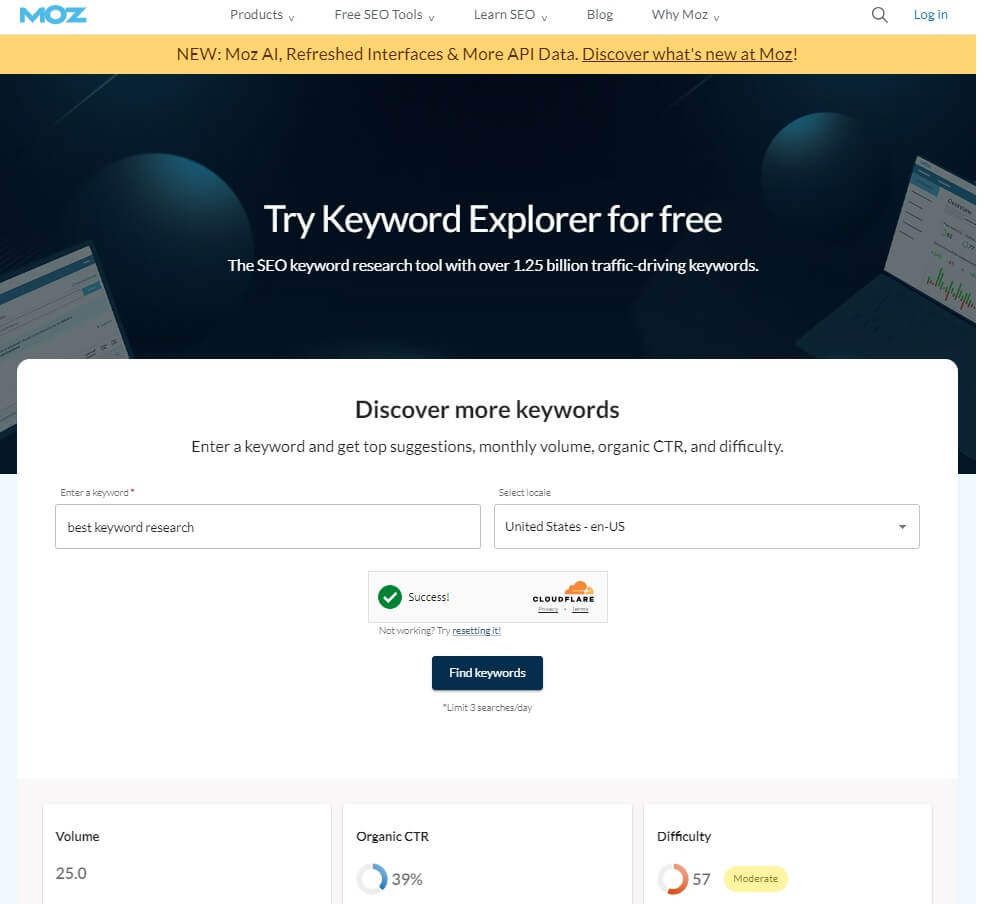
- Best for: All-around keyword research
- Standout Feature: Keyword prioritization metrics
- Free Plan: Limited to 10 queries per month
- Features & Functionality: Provides search volume, forecasting, SERP features, and competitive keyword insights.
- Pros: User-friendly interface with actionable data.
- Cons: Limited queries in the free version.
- Ideal for: SEO specialists and marketers who need thorough and actionable keyword insights.
5. SEMrush
SEMrush is known for its detailed dataset and tools covering many SEO aspects such as keyword research, site audits, competitor analysis, and more. It’s a robust suite designed for SEO professionals looking to conduct in-depth marketing analysis. SEMrush’s Keyword Magic Tool provides detailed keyword data, such as search volume and keyword difficulty, facilitating exploratory keyword research.
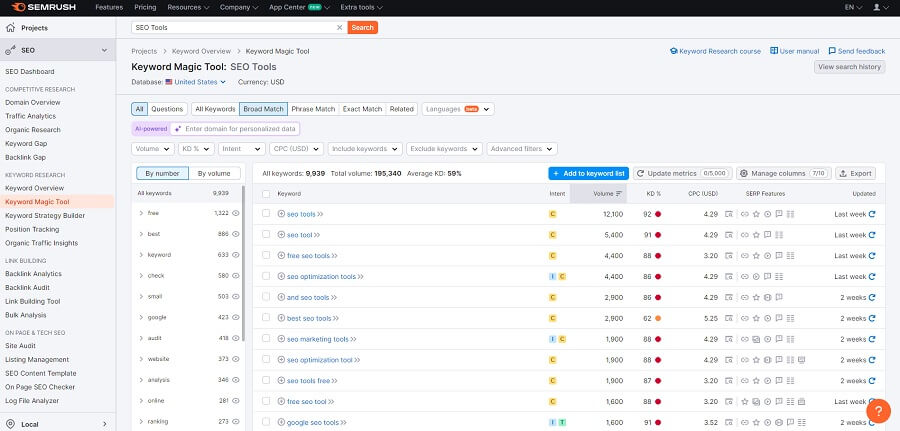
- Best for: Advanced SEO analytics and competitive research
- Standout Feature: Comprehensive toolkit for SEO, content marketing, and PPC
- Free Plan: 14 days free trial
- Features & Functionality: Includes keyword analytics, site audits, traffic analysis, and competitor tracking.
- Pros: Extensive features covering many aspects of digital marketing.
- Cons: Complex interface that may be overwhelming for beginners.
- Ideal for: Digital marketing professionals and agencies requiring a full spectrum of SEO tools.
6. Ubersuggest
Ubersuggest provides keyword discovery, competition insights, and SEO audit features. It’s particularly accessible for beginners and offers a straightforward approach to SEO audits and keyword research.
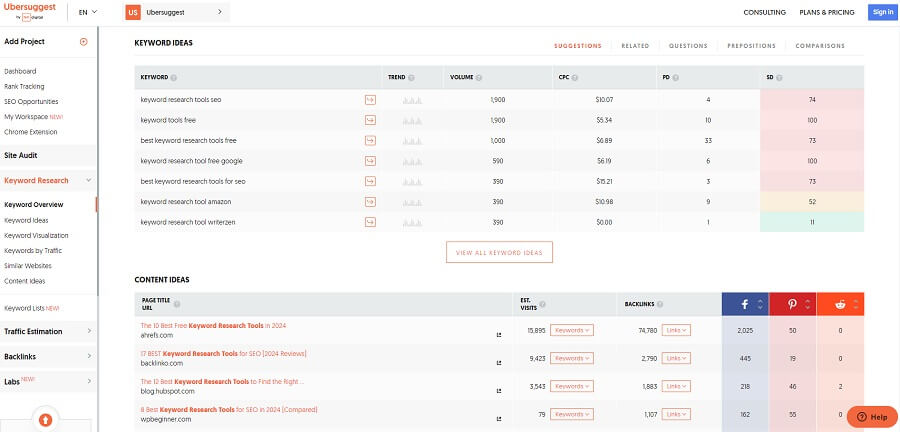
- Best for: Entry-level SEO insights and audits
- Standout Feature: SEO audit tools
- Free Plan: Limited to three free searches per day
- Features & Functionality: Offers SEO insights, keyword suggestions, and content ideas.
- Pros: Easy to use, with intuitive tools for beginners.
- Cons: Limited depth in the free version.
- Ideal for: Small business owners and novice marketers starting with SEO.
7. Answer The Public
Answer The Public provides insights into the questions and queries people are searching for around a specific keyword. It’s great for uncovering content ideas and understanding audience needs. It is one of the most effective free keyword research tool, particularly useful for generating keyword ideas without upfront costs.
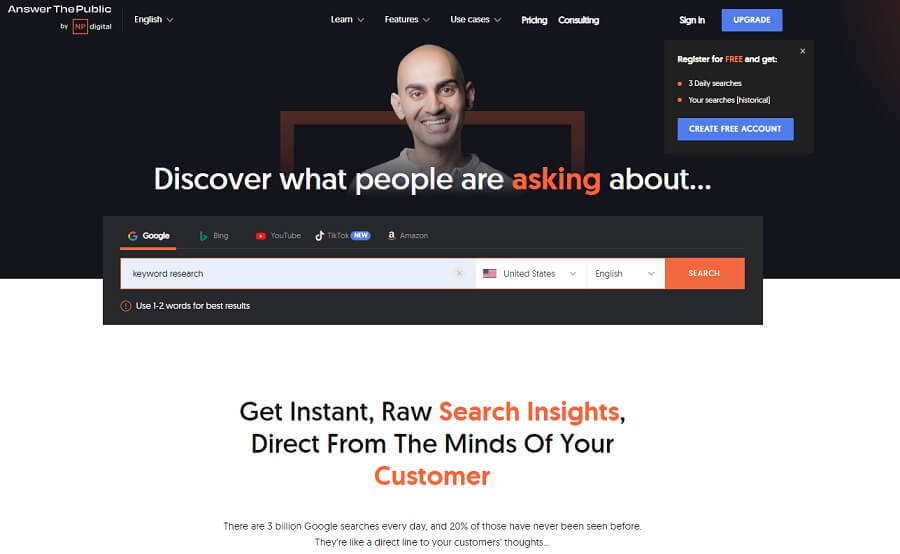
- Best for: Content ideation and question-based keyword research
- Standout Feature: Visualization of search questions and prepositions
- Free Plan: Provides a few searches per day
- Features & Functionality: Generates lists of questions, prepositions, and comparisons based on input keywords.
- Pros: Excellent for generating content ideas and answering audience queries.
- Cons: Limited searches in the free plan.
- Ideal for: Content marketers and writers looking for direct insights into audience interests.
8. SERP Checker
SERP (Search Engine Result Pages) Checker looks at the top-ranking pages for specific keywords, helping you understand the competitive landscape and potential long-tail keywords and topics for ranking terms.
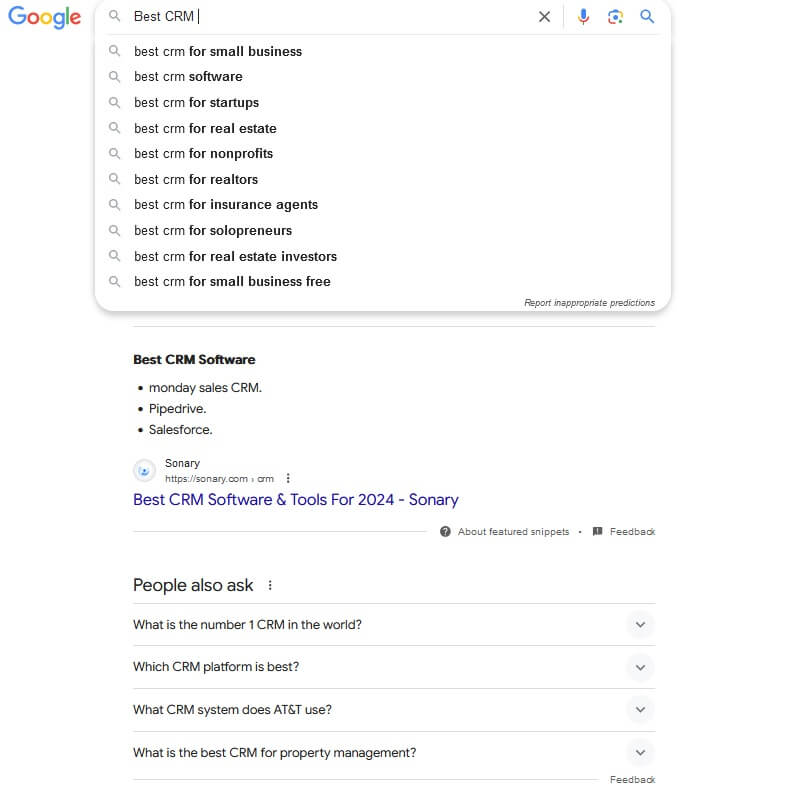
- Best for: Competitive analysis of SERP listings
- Standout Feature: Top-ranking keywords based on user intent
- Free Plan: Unlimited access
- Features & Functionality: Provides competitive insights and traffic estimation for keywords.
- Pros: Helps gauge the difficulty and potential of ranking for specific keywords.
- Cons: Limited insights.
- Ideal for: SEO experts and content strategists aiming to understand and compete in specific keyword niches.
Advanced Keyword Research Strategies
Advanced keyword research strategies involve using sophisticated tools and techniques to uncover valuable keyword opportunities that your competitors may have missed. Some advanced strategies include:
- Using Long-Tail Keywords: Target specific search queries with long-tail keywords, which are less competitive and more specific to user intent.
- Analyzing Competitor Keywords: Identify gaps in the market by analyzing the keywords your competitors are targeting.
- Keyword Clustering: Group related keywords together to create comprehensive content covering multiple search queries.
- Analyzing Search Volume and Competition: Evaluate the search volume and competition levels of the best keywords to target.
- Identifying Trending Keywords: Use keyword research tools to discover trending keywords and topics, allowing you to stay ahead of the curve and create timely, relevant content.
Keyword Tracking and Analysis
Keyword tracking and analysis involve monitoring your website’s performance for specific keywords and analyzing the data to optimize your SEO and PPC campaigns. This includes tracking keyword rankings, search volume, and competition and analyzing user behavior and conversion rates. By regularly tracking and analyzing your keywords, you can identify areas for improvement and make data-driven decisions to enhance your content and marketing strategies. This ongoing process helps you stay competitive and ensures that your efforts effectively drive traffic and conversions.
Location-Based and International Keyword Research
Location-based and international keyword research targets keywords specific to a particular geographic region or language. This approach helps you reach a more targeted audience and drive more relevant traffic to your website. Location-based keyword research focuses on keywords specific to a particular city, state, or country, while international keyword research targets keywords relevant to a specific language or region. Tools like Google Keyword Planner and SEMrush can assist in conducting location-based and international keyword research, providing insights into search volume and competition. You can effectively expand your reach and connect with a diverse audience by tailoring your keyword strategy to different locations and languages.
Why Keyword Research is Important to Content and SEO Strategy
Keyword research is the cornerstone of effective SEO and content strategies. It helps you understand what your target audience is searching for, enabling you to tailor your content to meet their needs. It can also inform your decisions on product offering, packaging, and marketing strategies. Here’s how to leverage keyword research effectively:
- Identify Audience Needs: Use keyword research to discover the queries and problems your target audience is searching for online. This alignment with user intent increases the relevance of your content, enhancing user engagement and satisfaction.
- Optimize for Search Engines: By incorporating the right keywords into your content, titles, and meta descriptions, you improve your visibility in search engine results pages (SERPs), making it easier for potential customers to find you.
- Content Strategy Development: Keyword research informs your content calendar. Understanding trending and evergreen keywords allows you to plan relevant content over time, attracting continuous traffic.
- Competitive Analysis: Analyzing the keywords your competitors are targeting can reveal gaps in their strategies that you can exploit. It also helps you understand the industry benchmark and set realistic SEO goals.
How to Find Low-Competition Keywords That Drive Traffic
Discovering low-competition keywords that still attract substantial traffic can transform your SEO strategy. It enables you to invest less in each keyword and even capture ever-growing niche markets in your industry. Here’s how to find these valuable keywords:
- Use Keyword Tools: Start with tools like Google Keyword Planner, Moz, or SEMrush to generate initial keyword ideas. Look for keywords with decent monthly search volumes but low competition scores.
- Focus on Long-Tail Keywords: Long-tail keywords are more specific and less competitive. Because they are more specific to user intent, they often have lower search volumes but higher conversion rates.
- Analyze Search Intent: Understand the intent behind the keywords. Are users looking to buy, learn, or find a specific location? Tailoring content to match this intent increases the likelihood of attracting targeted traffic.
- Check the SERPs: Evaluate the search engine results pages for your chosen keywords. Are there well-established websites ranking for them? If not, these keywords might offer a good opportunity for you.
How to Use AI Tools for Keyword Research
AI tools can significantly enhance keyword research, providing insights and efficiency gains. Here’s how to use Google Gemini and ChatGPT for keyword research:
- Google Gemini: Utilize this tool for its deep learning capabilities in processing large datasets. It can help identify patterns and trends in keyword searches that might not be apparent from human analysis alone. Explore different keyword combinations and analyze the performance data to refine your strategy.
- ChatGPT: Leverage ChatGPT to generate content ideas and keyword suggestions. Provide a topic or a seed keyword, and ask for related questions, topics, or prepositions. ChatGPT can offer creative expansions on these topics, helping you to explore new angles for content that might not yet be heavily targeted.
- Integrate Insights: Combine the outputs from both tools to develop a robust keyword strategy. Google Gemini can offer quantitative insights, while ChatGPT can enhance qualitative content planning.
Final Thoughts
Choosing the best free keyword research tool for your business can make a huge difference in your SEO and content strategy. Each tool has its unique strengths — whether it’s the detailed SEO insights from Ahrefs Webmaster Tools, the performance reporting from Google Search Console, the trend analysis with Google Trends, or the competitive analysis from SERP Checker.
By learning the features and limitations of each tool, you can pick the one that best fits your business needs. Effectively using these tools can help you drive targeted traffic, boost your website’s visibility, and achieve your SEO goals. These tools can also help you understand consumer interests and preferences, which can help you make data-driven decisions that promote customer loyalty and business growth.
So dive in and compare your options, and watch your website grow.
FAQ
Q: What are the best free tools for keyword research?
A: There are several great free tools for keyword research, including Ahrefs Webmaster Tools, Google Search Console, Google Trends, Moz Keyword Explorer, SEMrush, Ubersuggest, Answer The Public, and SERP Checker. Each offers unique features to help you optimize your SEO strategy.
Q: How can I find low-competition keywords?
A: To find low-competition keywords, use tools like Google Keyword Planner, Moz, or SEMrush to generate keyword ideas. Focus on long-tail keywords, analyze search intent, and evaluate the SERPs to identify opportunities where competition is lower but traffic potential is still good.
Q: How do AI tools help in keyword research?
A: AI tools like Google Gemini and ChatGPT enhance keyword research by processing large datasets and identifying patterns and trends that might not be apparent through manual analysis. They can generate content ideas, keyword suggestions, and provide deeper insights into keyword performance.
Q: Why is keyword research important for SEO and content strategy?
A: Keyword research helps you understand what your target audience is searching for, allowing you to tailor your content to meet their needs. It improves your visibility in search engine results, informs your content strategy, and provides competitive insights to help you achieve your SEO goals.








